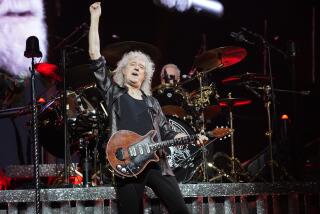Opera singer Eric Jordan sings his way through stroke recovery process
One early morning in September 2012, Eric Jordan was awakened by the cries of his 20-month-old son — and that kept him from dying in his sleep. As he tried to go to his child, Jordan fell to the floor, paralyzed. The opera singer would soon learn that he had undergone a severe stroke that robbed him of his speech.
After awakening from surgery, Jordan still couldn’t speak and feared his career singing bass with the Metropolitan Opera was over. But he soon made an uplifting discovery: Even as he struggled to relearn to speak, he could sing.
Six weeks after his stroke, Jordan, 41, returned to sing on the Met stage, and he remains on the roster today.
In a voice that can sound slightly robotic as he enunciated every syllable, he spoke about his journey back from his stroke. After he sweetly sang a few perfect bars of “Puff, the Magic Dragon,” the sentences that followed suddenly flowed freely.
Both your son and your wife helped save your life?
My baby boy woke me at 5:30 in the morning. I stood up and then passed out. My wife reacted quickly. She saw my face drooping and my right arm dangling. I couldn’t speak. She called 911, and I was rushed to New York Presbyterian Hospital. Conventional treatment did not work so a mechanical thrombectomy procedure was performed. That means a small device was used to surgically remove the blood clot in my brain and blood flow was restored. Every hospital should have one of those devices. Those three things — my son, my wife and the surgery — are why I’m still alive.
Why is it easier for you to sing than speak?
The stroke affected the left part of my brain, where speech and fine-motor tuning are governed. The right part of my brain is the singing part. My piano playing and guitar picking are helping my fine-motor skills. After surgery, I woke up in a panic because I was supposed to perform that night, and I could not even speak. I used to love to talk, so it was terribly devastating.
How were you able to return to performing so quickly?
Five days after my stroke I began physical, speech and occupational therapy. My speech pathologist taught me to speak loudly and slowly, and to use short sentences. My coach from the Met helped me regain my full ability to sing. My wife, Christina, is also a singer and gave me so much support. I got my chance to return to the Met when another singer had jury duty. When I took the stage again, I was very scared but happy and thankful, all the emotions you could think or feel. Luckily, I’m still an employable singer.
Has the stroke affected you in other ways?
My long-term memory is fully intact. My mid-term memory is OK, maybe at 80%. But my short-term memory is shot, so I take a lot of notes. My speech is improving every week. I’m happy to say that the singer might fully regain his speech someday. I sing and scat my way through the day. Instead of reading children’s books to my son, Gabriel, I sing them.
You plan to tour to share your story as a stroke survivor?
I will work with medical facilities to help stroke patients learn to recover their speech through singing. If they are having trouble speaking, I want them to remember that they can always sing through their troubles.
More to Read
Sign up for Essential California
The most important California stories and recommendations in your inbox every morning.
You may occasionally receive promotional content from the Los Angeles Times.











